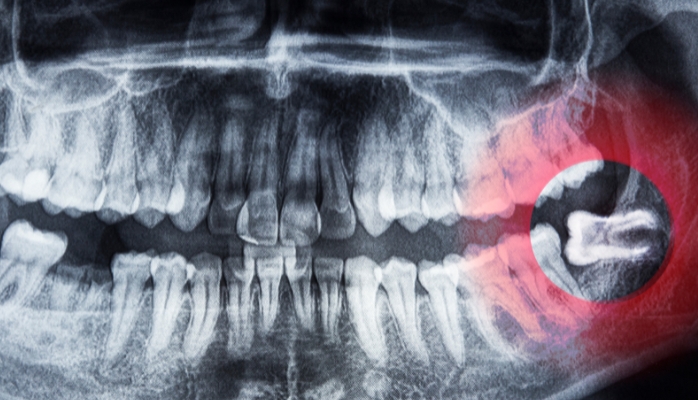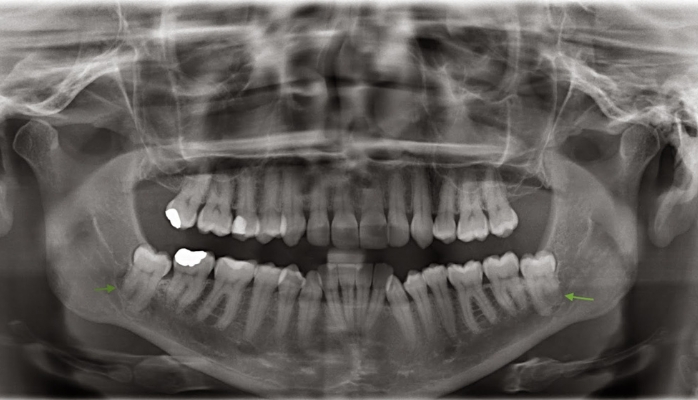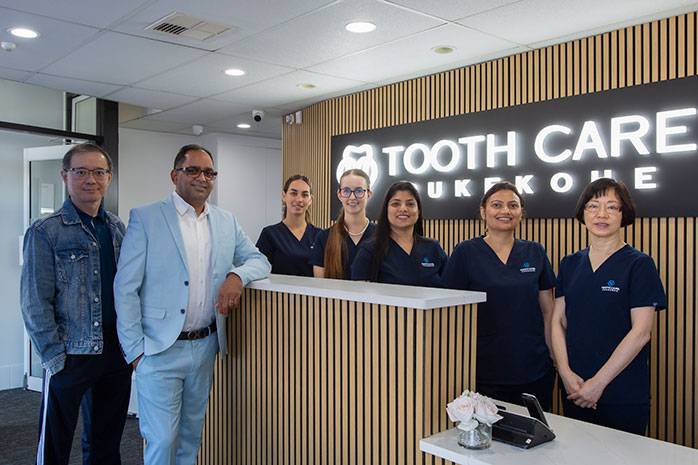Wisdom Teeth Extractions
Wisdom Tooth Extractions Pukekohe
At Tooth Care Pukekohe, we understand that wisdom teeth – or third molars – can often lead to discomfort, complications, or even more serious oral health issues. If they are impacted, misaligned, or at risk of causing damage to adjacent teeth, extraction may be necessary.
Our goal is to ensure a smooth, comfortable experience while safeguarding your long-term oral health. We use advanced technology, including OPG (Orthopantomogram) and CBCT (Cone Beam Computed Tomography) scans, to assess and plan your treatment with unparalleled accuracy.
If you’re experiencing pain or other concerns with your wisdom teeth, our team of experienced dentists is here to guide you through the process of extraction with care and precision.
Why do Wisdom Teeth Need to Be Removed?
While wisdom teeth are a natural part of human development, they frequently become problematic. The most common reasons for wisdom teeth extraction include:
- Impaction: Wisdom teeth may fail to emerge properly, becoming impacted either partially or fully. This can cause significant pain, swelling, and the potential for infection.
- Crowding: In cases where the jaw lacks sufficient space, wisdom teeth can push against adjacent teeth, leading to misalignment or damage to surrounding structures.
- Decay and Infection: Due to their position at the back of the mouth, wisdom teeth are difficult to clean effectively. This increases the risk of cavities, gum disease, and infection.
- Cyst Formation: Impacted wisdom teeth can cause cysts or tumors that may damage the jawbone, nerves, and adjacent teeth, further complicating treatment if not addressed promptly.


Why do Wisdom Teeth Need to Be Removed?
While wisdom teeth are a natural part of human development, they frequently become problematic. The most common reasons for wisdom teeth extraction include:
- Impaction: Wisdom teeth may fail to emerge properly, becoming impacted either partially or fully. This can cause significant pain, swelling, and the potential for infection.
- Crowding: In cases where the jaw lacks sufficient space, wisdom teeth can push against adjacent teeth, leading to misalignment or damage to surrounding structures.
- Decay and Infection: Due to their position at the back of the mouth, wisdom teeth are difficult to clean effectively. This increases the risk of cavities, gum disease, and infection.
- Cyst Formation: Impacted wisdom teeth can cause cysts or tumors that may damage the jawbone, nerves, and adjacent teeth, further complicating treatment if not addressed promptly.
The Wisdom Teeth Extraction Procedure at Tooth Care Pukekohe
At Tooth Care Pukekohe, we utilize the latest in diagnostic imaging and surgical techniques to ensure a safe and effective extraction process. Each procedure is carefully tailored to your specific needs, allowing for optimal results.
- Comprehensive Consultation and Advanced Imaging
The first step in your treatment is an in-depth consultation, where we discuss your symptoms, review your medical history, and evaluate the best course of action. To ensure precise planning and accurate diagnosis, we rely on OPG (Orthopantomogram) and CBCT (Cone Beam Computed Tomography) scans.- OPG (Panoramic X-ray): This 2D imaging technique provides a clear view of your entire jaw and teeth, enabling us to assess the positioning of your wisdom teeth and detect potential issues such as impaction, decay, or infection.
- CBCT (Cone Beam CT): For a more detailed and three-dimensional view of your teeth, jaw, and surrounding structures, CBCT scans offer superior imaging that allows us to:
- Precisely locate impacted wisdom teeth.
- Evaluate the proximity of the teeth to critical structures such as nerves, blood vessels, and sinuses.
- Plan the extraction procedure with unparalleled accuracy, ensuring minimal risk of complications.
These advanced diagnostic tools play a critical role in creating a comprehensive treatment plan, allowing us to address your specific needs with precision.
- Anaesthesia and Sedation Options to Ensure Your ComfortTo ensure a pain-free and comfortable experience, we offer:
- Local Anesthesia: This numbs the immediate area around the tooth, allowing for a pain-free procedure while you remain fully conscious.
- Sedation Options: For patients who experience anxiety or require more extensive extractions, we offer oral sedation to ensure a calm, relaxed state throughout the procedure.
Our team will carefully discuss your options with you during the consultation to determine the most suitable anaesthesia choice for your unique case.
- Precision Extraction
Once your treatment plan is established and anaesthesia is administered. We’ll make small, precise incisions to access the wisdom teeth, and in some cases, remove a small portion of bone if necessary. If the tooth is impacted, we may break it into smaller pieces for easier removal. Throughout the procedure, you’ll be well taken care of, and we’ll take every step to minimize discomfort.Our experienced dentist employ the latest techniques to ensure that the procedure is as efficient and minimally invasive as possible, reducing trauma to surrounding tissues and promoting faster healing. - Post-Operative Care and RecoveryAfter the extraction, we provide comprehensive aftercare instructions to ensure a smooth recovery. Most patients experience mild swelling and discomfort in the first few days, which can be effectively managed with prescribed pain medication and at-home care. Key post-operative instructions include:
- Rest: Avoid strenuous activity for 24-48 hours to promote optimal healing.
- Pain Management: Follow prescribed pain relief instructions and use over-the-counter pain medications as needed.
- Swelling Control: Apply cold compresses to the face for 10-15 minutes at a time to reduce swelling.
- Diet: Stick to soft, cool foods such as soups, smoothies, and mashed potatoes for the first few days. Avoid hot, spicy, or hard foods.
- Oral Hygiene: Starting 24 hours post-surgery, gently rinse with warm saltwater to keep the extraction site clean. Avoid brushing directly on the site until it is fully healed.
We will schedule follow-up appointments to monitor your healing process and address any concerns that may arise.

Potential Complications and Risks
While wisdom teeth extractions are generally safe, as with any surgical procedure, there are inherent risks. These include:
- Infection: Infection is a common complication following oral surgery, but it can be minimized with proper care. We provide clear instructions on how to reduce the risk and what to do if infection symptoms arise.
- Dry Socket: This painful condition occurs when the blood clot in the extraction site is dislodged, exposing the bone. Dry socket can be prevented by following post-operative care guidelines, such as avoiding sucking motions or smoking.
- Nerve Damage: In some cases, especially when wisdom teeth are close to nerves, there may be a risk of nerve injury. This could result in temporary or, in very rare cases, permanent numbness or tingling in the lips, tongue, or chin. To minimize this risk, we use advanced imaging technology, including CBCT scans, to accurately map out the position of nerves and other critical structures, ensuring a precise extraction.
- Damage to Adjacent Teeth: If wisdom teeth are impacted or positioned at an unusual angle, there is a risk of damaging nearby teeth during extraction. However, our detailed imaging ensures that the extraction is performed with minimal risk of harming surrounding teeth.
Coronectomy: A Minimally Invasive Approach
In certain cases, particularly when wisdom teeth are closely positioned to important nerves, a coronectomy may be recommended. A coronectomy is a more conservative approach that involves removing only the crown (top portion) of the impacted tooth, leaving the root in place. This is done to reduce the risk of nerve damage while still alleviating the issues caused by the wisdom tooth. The root is left in place and monitored for any future complications.
The root is left in place and monitored for any potential issues over time. This approach can help preserve nerve function while providing relief from the problems caused by an impacted tooth. We may recommend this procedure after carefully evaluating your specific case with the help of CBCT scans.


Coronectomy: A Minimally Invasive Approach
In certain cases, particularly when wisdom teeth are closely positioned to important nerves, a coronectomy may be recommended. A coronectomy is a more conservative approach that involves removing only the crown (top portion) of the impacted tooth, leaving the root in place. This is done to reduce the risk of nerve damage while still alleviating the issues caused by the wisdom tooth. The root is left in place and monitored for any future complications.
The root is left in place and monitored for any potential issues over time. This approach can help preserve nerve function while providing relief from the problems caused by an impacted tooth. We may recommend this procedure after carefully evaluating your specific case with the help of CBCT scans.

Why Choose Tooth Care Pukekohe for Your Wisdom Teeth Extraction?
- Expert Surgical Care: Our Dentitst are highly skilled and experienced in performing wisdom teeth extractions, including complex cases that require advanced techniques such as coronectomy or extraction near sensitive nerves.
- State-of-the-Art Technology: We use the latest imaging technologies, including OPG and CBCT, to ensure that we have a clear and detailed understanding of your dental anatomy, minimizing risks and optimizing treatment outcomes.
- Comprehensive, Compassionate Care: From your initial consultation to post-operative follow-up, our team is committed to providing thorough, compassionate care to ensure the best possible recovery.
- Patient-Centered Approach: We take the time to listen to your concerns and customize our approach to meet your specific needs, ensuring your comfort and peace of mind throughout the process.
If you are experiencing discomfort or complications due to your wisdom teeth, it’s essential to seek professional care as soon as possible. Contact Tooth Care Pukekohe today to schedule a consultation with our dentist. We are here to guide you through every step of the process and provide the best possible care for your oral health